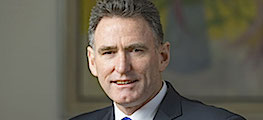Royal Bank of Scotland CEO Ross McEwan told the Press Association in an interview it could take another 10 years for the bank’s tarnished reputation to recover from its role in the financial crisis and a series of scandals.
McEwan said that while the bank has managed to regain its financial footing since its £45 billion bailout in 2008, recording its first annual profit in a decade this year, customers are still distrustful of RBS.
“There are two things that any financial service organisation has … one is our financial strength and the second is our reputation,” he said.
“And what RBS did 10 years ago, it had lost both of those.
“It got very close to collapse and with that went its financial reputation.
“And we’ve been hit with reputational issues as a consequence of what happened in the financial crisis, from conduct to litigation issues to GRG (the Global Restructuring Group) to all sorts of issues that over the last 10 years have embroiled this organisation.”
RBS is still 62% owned by the UK taxpayer
RBS recently came at the bottom of service rankings by the UK’s Competition and Market Authority for both business and retail banking.
McEwan said he was “concerned” and “disappointed” by this result, but not surprised.
“I think the reputation piece will take another 5-10 years – and that’s what it is when your reputation gets tarnished so badly,” McEwan said.
He added: “It’s pretty clear that RBS got a lot of things wrong in the lead up to the financial crisis.
“But like many other banks, growth was the big agenda.
“Everybody wanted scale, everybody saw that was the way to get more profitable and I think we got caught up, being RBS, in that euphoria for growth and being big.
“We ended as the biggest in the world with the acquisition of ABN Amro as the final move.”
McEwan acknowledged RBS’s role in the financial collapse.
“We were very much part of it and I think we forgot why we, as a bank, were here — which was to serve customers — and like many other banks they really started to think they were to serve their own needs and the shareholders’ needs only.
“So, look, we were a big part of it – particularly here in the UK.
“We weren’t on our own, but were were certainly a big part of it.”
